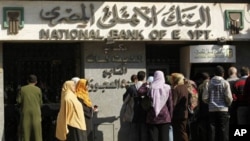The Egyptian government has tried to restore a sense of normality in Cairo after almost two weeks of opposition protests by re-opening banks and encouraging people to return to work.
Egyptian authorities opened some bank branches in the capital, Sunday, for the first time in a week, and customers lined up to withdraw money. But, the government ordered the banks to limit the size of withdrawals and limited opening hours.
Traffic also returned to streets of central Cairo Sunday as Egypt began its working week. Egyptian financial officials had planned to re-open the country's stock market on Monday, but changed their minds Saturday and gave no new date.
Egypt's stock market crashed late last month as anti-government protests erupted nationwide, losing $12 billion in value in two days of trading before authorities shut it down. The demonstrators want President Hosni Mubarak to resign after 30-years in power.
Egyptian Finance Minister Samir Radwan says the country's economic plight is "very serious" because of the political unrest that has paralyzed much of the economy and driven away tourists, a key source of foreign exchange.
Deputy central bank governor Hisham Ramez says Egypt has $36 billion in official foreign reserves, enough to honor all transactions.
Mubarak met with his economic team Saturday to discuss the financial impact of the protests. The French bank Credit Agricole said Friday that the turmoil is costing the Egyptian economy at least $310 million each day.
Egypt Banks Reopen for Several Hours, Stock Market Stays Shut

Hundreds of Egyptians queued outside banks



